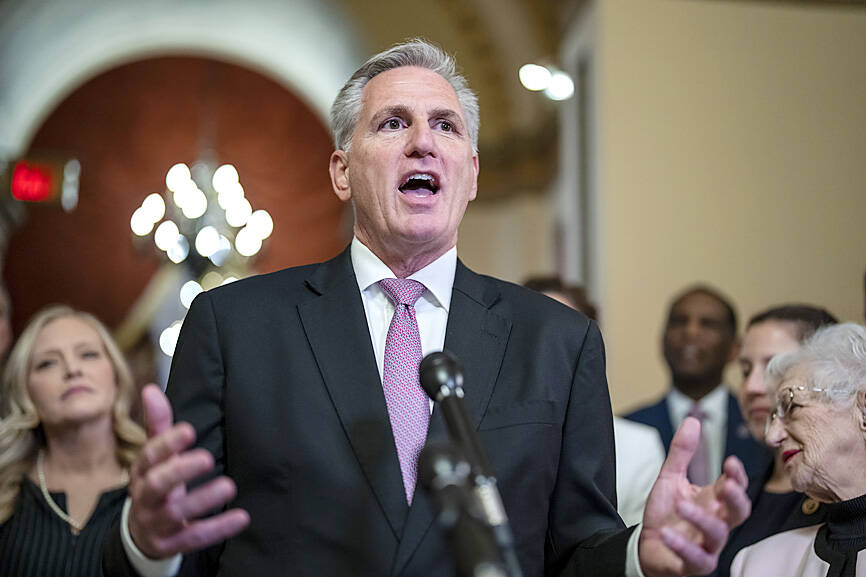The Joint Intelligence Operations Center of the US Indo-Pacific Command is operating under “a heightened state of vigilance” as the US braces for possible diplomatic and military backlash from China over President Tsai Ing-wen’s (蔡英文) expected meeting with US House of Representatives speaker Kevin MacCarthy next week, the Washington Post reported yesterday.
The last time the center took such action was during then-US House of Representatives speaker Nancy Pelosi’s visit to Taipei in August last year, command spokesman Kyle Raines was quoted as saying.
Intelligence personnel have heightened their watch for hostile actions and are preparing for an increase in information requests from commanders in the region, he said.

Photo: AP
Beijing’s response could vary from harsh language, sanctions on MacCarthy and US officials, or a show of force that “matched or exceeded the dramatic display when missiles were fired over Taiwan” following Pelosi’s visit, the Post said.
Tsai’s anticipated meeting with McCarthy is likely seen by Beijing as less provocative than Pelosi’s visit, and would “refrain from extreme aggression,” a senior US intelligence official was cited as saying on the condition of anonymity.
However, the uncertainty over China’s intentions indicate that the cross-strait situation is tense, the report said.
Tsai arrived in New York City on Wednesday afternoon for a two-night stay on her way to visit Central American diplomatic allies Guatemala and Belize, and on Wednesday next week is to arrive in Los Angeles where she is expected to meet with McCarthy during a two-night stay before returning to Taipei.
Tsai meeting the US House speaker outside of Taiwan has lessened the potential for an aggressive response by China, as opposed to what was seen after Pelosi’s visit to Taipei, National Security Bureau Director-General Tsai Ming-yen (蔡明彥) said yesterday.
Tsai Ming-yen was responding to Chinese Nationalist Party (KMT) Legislator Charles Chen’s (陳以信) questions at a meeting of the legislature’s Foreign Affairs and National Defense Committee.
China is likely to behave more diplomatically in light of upcoming state visits to Beijing by officials from Malaysia, Singapore, Spain and France, along with European Commission President Ursula von der Leyen, he said.
The heads of these states said they would cancel their trips if China engages in reckless military activity, he added.
Beijing traditionally resorts to hostility whenever Taiwan makes significant diplomatic gains, Tsai Ming-yen said in response to a question from KMT Legislator Johnny Chiang (江啟臣).
The Chinese People’s Liberation Army could heighten “war preparedness patrols” by military aircraft or conduct large-scale war games, Tsai Ming-yen said.
Although Taiwan cannot discount the possibility that China might move large concentrations of ships and aircraft around the nation upon Tsai Ing-wen’s return, there is no evidence of that kind of activity happening now, he added.
Meanwhile, intelligence showed that China is paying protesters US$200 to gather at Tsai Ing-wen’s hotel and other locations, Tsai Ming-yen told lawmakers.
Beijing mobilized a wide variety of groups, including Chinese immigrants, members of the Alliance for China’s Peaceful Reunification and organized crime groups, in a bid to disrupt her transit through the US, he said.
The US has closely coordinated with Taiwan to ensure Tsai Ing-wen’s safety, he said, adding that the New York and Los Angeles police departments are sharing information with the bureau.

DAREDEVIL: Honnold said it had always been a dream of his to climb Taipei 101, while a Netflix producer said the skyscraper was ‘a real icon of this country’ US climber Alex Honnold yesterday took on Taiwan’s tallest building, becoming the first person to scale Taipei 101 without a rope, harness or safety net. Hundreds of spectators gathered at the base of the 101-story skyscraper to watch Honnold, 40, embark on his daredevil feat, which was also broadcast live on Netflix. Dressed in a red T-shirt and yellow custom-made climbing shoes, Honnold swiftly moved up the southeast face of the glass and steel building. At one point, he stepped onto a platform midway up to wave down at fans and onlookers who were taking photos. People watching from inside

MAKING WAVES: China’s maritime militia could become a nontraditional threat in war, clogging up shipping lanes to prevent US or Japanese intervention, a report said About 1,900 Chinese ships flying flags of convenience and fishing vessels that participated in China’s military exercises around Taiwan last month and in January last year have been listed for monitoring, Coast Guard Administration (CGA) Deputy Director-General Hsieh Ching-chin (謝慶欽) said yesterday. Following amendments to the Commercial Port Act (商港法) and the Law of Ships (船舶法) last month, the CGA can designate possible berthing areas or deny ports of call for vessels suspected of loitering around areas where undersea cables can be accessed, Oceans Affairs Council Minister Kuan Bi-ling (管碧玲) said. The list of suspected ships, originally 300, had risen to about

A Vietnamese migrant worker yesterday won NT$12 million (US$379,627) on a Lunar New Year scratch card in Kaohsiung as part of Taiwan Lottery Co’s (台灣彩券) “NT$12 Million Grand Fortune” (1200萬大吉利) game. The man was the first top-prize winner of the new game launched on Jan. 6 to mark the Lunar New Year. Three Vietnamese migrant workers visited a Taiwan Lottery shop on Xinyue Street in Kaohsiung’s Gangshan District (崗山), a store representative said. The player bought multiple tickets and, after winning nothing, held the final lottery ticket in one hand and rubbed the store’s statue of the Maitreya Buddha’s belly with the other,

Japan’s strategic alliance with the US would collapse if Tokyo were to turn away from a conflict in Taiwan, Japanese Prime Minister Sanae Takaichi said yesterday, but distanced herself from previous comments that suggested a possible military response in such an event. Takaichi expressed her latest views on a nationally broadcast TV program late on Monday, where an opposition party leader criticized her for igniting tensions with China with the earlier remarks. Ties between Japan and China have sunk to the worst level in years after Takaichi said in November that a hypothetical Chinese attack on Taiwan could bring about a Japanese